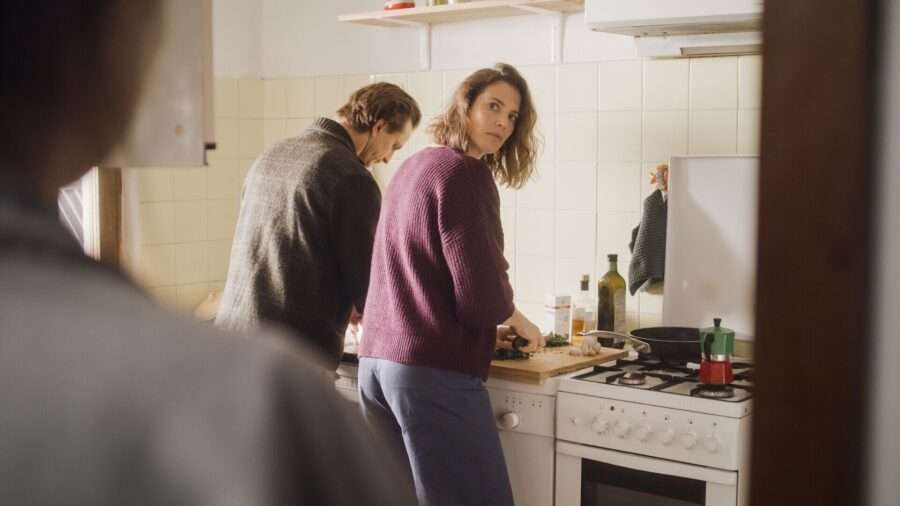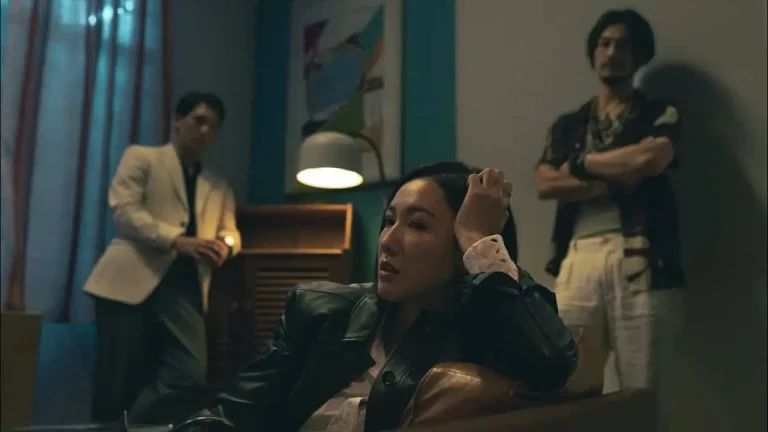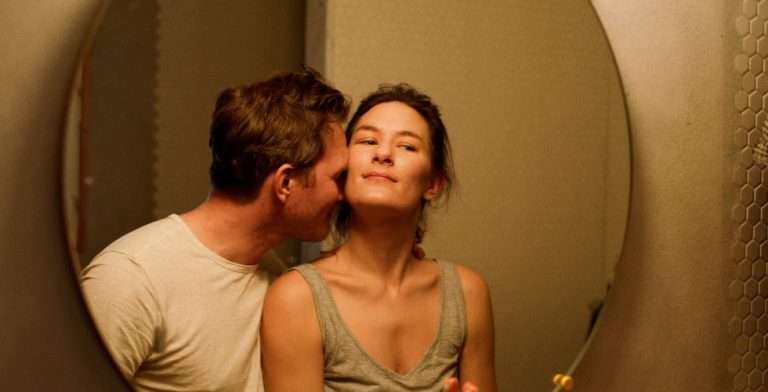Pipi Fröstl and Felix Krisai’s short film “Strangers Like Us” is a deliciously twisted exploration of the repressed possibilities underpinning suburbia life. Laura (a superb Henrietta Rauth) and Elias (Sebastian Wendelin) lead a by-the-numbers life that has settled into a series of predictable routines and patterns. Their marriage seems relatively non-confrontational, imbued with a resignation to regular, unsurprising rhythms.
The two are just back from a vacation when the film opens. Elias springs on his wife, which she takes as a shocker. He has invited a couple, Nina (Anna Rot) and Patrick (Achmed Abdel-Salam), to their house, which they have newly moved into. They’d met the couple on their trip. Laura had liked them, Elias reminds her. Yet, she emphasizes they hadn’t established such intimacy and comfort that she’d have promptly invite them home.
This, however, is only the smallest of disconcerting discoveries which are in abundance in the film. What jolts Laura is the guests behaving with the ease of ownership over the space that is her home. Nina lets the cat in for food as if she is aware of its routine. When Elias accidentally spills wine on Patrick’s shirt, Nina swiftly rummages through Elias’ own clothes in his room, pulling out one for her husband. The couple acts like it’s their home. While a flabbergasted Laura protests at the peculiarity of the events, Elias doesn’t seem so bothered. He suggests they let it be.
This is a film packed with sudden, rapid shifts. Jarring realizations abound, as do the complex, varied moods of its characters that seem near impossible to pin down and receive a fixed categorization. Laura’s startlement singularly threads the film together as bewildering developments escalate over the course of the narrative. Along with the role reversal, their emotional processing also switches from an initial alarm to a subsequent skid into internalizing the transition.

The directors present the unraveling to a muted, natural effect. The horror builds gradually with understatement. Strangers like Us’s edgy brilliance is in its seamless weaving of disquiet into the folds of normalcy. When the two become enmeshed, it is difficult to tell, and this film subtly capitalizes on this undramatically molded transformation.
“The Singers,” directed by Fabian Rausch and Zorah Berghammer, mostly centers around events of one evening. The film starts with a couple and their child, a young girl, on a drive. However, there has been a delay and unexpected circumstances arrive. Cutting between this track and scenes at a pub, the two tracks eventually meld together. The husband warms up to the idea of taking shelter in an unknown place only after some persuasion and the persistent nudging of the wife. At the pub, the old minutely survey the young, discussing among themselves who an unfamiliar face could be.
The lack of music at the pub forces the youths to become the necessary source of liveliness. Though the film is deliberately compressed, the directors inject it with sufficiently teasing implications. There is a niggling feeling that slowly grows in the viewer of things bubbling beneath the cool surface. The obvious may have a seething, discomfiting underside as the film traverses the distance between reluctance and submission.
We feel as if the circumstances can topple over for the worse, and something heated may be dangling on the anvil. The film opts for a repressed style until the lid comes off in a powerfully expressive coda. “The Singers” thrives on the suggestive but also distinguishes itself by its willingness to burst all out with an effective segue.






![Hridayam [2022] Review: Vineeth’s breezy love letter to a past with a lived-in feel](https://79468c92.delivery.rocketcdn.me/wp-content/uploads/2022/02/Hridayam-2022-2-768x405.png)
![Actual People [2021]: ‘Locarno’ Review: Seeking Sanity in the Modern World](https://79468c92.delivery.rocketcdn.me/wp-content/uploads/2021/08/Actual_People_2-768x432.jpeg)
![Cartel Land [2015]: On the Frontlines of Narco Culture](https://79468c92.delivery.rocketcdn.me/wp-content/uploads/2015/11/1401x788-15282-1-1100.jpg)